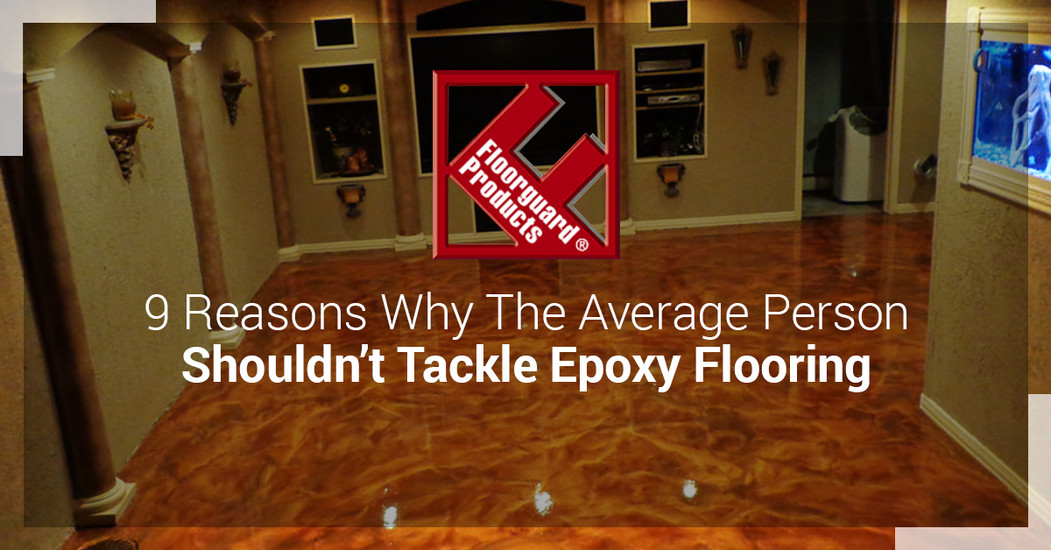The Reasons Epoxy Floor Coatings Beats Other Types of Basement Floors
Posted by Floorguard Products, Inc. on Feb 1st 2018
Let’s say you have a potential customer who comes to you asking you for a quote for their basement. They’ve just built a house, the only thing there is bare concrete, and they haven’t yet decided how they’re going to cover the floor.
These customers might be letting the cost determine what kind of flooring they get, but while you’re giving them a quote you might want to give them something else to think about. After all, basements are now one of the primary living spacing in a home. They didn’t start off that way, of course. First there was no space at all under a house, and then people started digging that space out to make root cellars and tornado shelters. Some time later these spaces because part of the foundation of the house, but they often leaked and were smelly. It’s only been in the last 50 years or so that basements became livable, as water tables were kept out and bedrooms started being added.
But that doesn’t mean that the water is always kept out, or that every type of flooring should have its place in a basement. Let’s go over some of the benefits that epoxy floor coatings have over the following options in floor coverings.
Carpet
Once basements started getting relatively water-tight, what was the way to really show that you had a nice underground living space? Put carpet down to match the rest of the house, of course. But as nice as carpet can be on a cold floor, the basement is still the room of the house most susceptible to water damage. It could be because the concrete fails and lets in water from the ground or the underground walls. It could be that the light wells let the rainwater in, or water comes in through the sliding door of a house with a walkout basement. Heck, even an overflowing toilet or sink in a basement can cause all sorts of problems. Just remind any potential customers that epoxy floor coatings don't care if they get wet or not, while the carpet getting soaked just once might have to be completely replaced.
If customers seem bent on putting down carpet, you might convince them that certain parts of the basement should be left with a harder concrete sealer. Basement kitchens or wet bars are an excellent example of a space that could benefit from a metallic epoxy floor coating. The space around a pool table is also better with floor paint so that the table stays level. Oh, and those lucky enough to have a wine cellar probably won’t want it carpeted. Of course, any entrances into the basement could also benefit when people come in with muddy or wet shoes.
Tile
Tile can be a popular option in a basement, especially in those last couple of spaces we mentioned (at basement entrances or around the wet bar). Most customer will understand the importance of keeping carpet away from certain areas of a basement.
But tile can also fulfill those need of areas more likely to get wet. So what’s to make them choose a concrete floor epoxy over tile? Well, tile has a few problems that people don’t think about when they’re having it installed and don’t realize until years later. First of all, there’s the grout to deal with. Grout often starts turning colors and get grimy and can be hard to clean. Second, and more importantly, is that tile is very difficult to replace once it cracks. Even if you keep a perfect match for it over the years a replacement, the amount of wear between the old and the replacement tile will be noticeable.
Hardwood / Laminate
Hardwood floors in the basement aren’t for everyone. For some people, it brings the look from the rest of the house downstairs, and it really works if the basement is any sort of office space.
On the other hand, hardwood floors subconsciously feel weird to us. After all, hardwood flooring on the main level makes sense because hardwood flooring was part of the structure of the house. That’s what hardwood floors originally were, after all, and laminate flooring is about bringing back the look of older houses. But hardwood in a basement is weird because basements floors were never made of wood, so you’re just putting one hard surface over another.
While hardwood floors hold up better than carpet if it gets flooded, it’s still going to have problems if there’s too much water of if waterlogged for too long. It will warp and become separated from underneath, and it could start growing mold as well.
When customers come to you wanting to go with anything other than a concrete floor sealant, we hope you can use some of the above example to steer them in the right direction. If they bite, be sure to grab everything you need from Floorguard!


